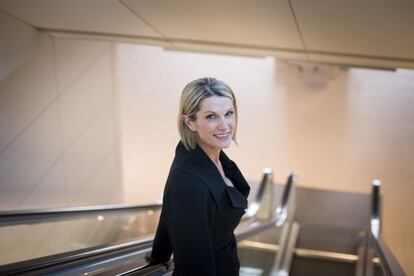"In Europe everyone is waiting for the Chinese collectors to arrive"
Spain is a straggler in the global art market, says economist Clare McAndrew


Clare McAndrew is an economist who specializes in the art market. The reports produced by her firm, Arts Economics, which she founded in 2005 with the aim of researching the art economy, are global reference points. After the publication of its study on the 2012 outlook for Spain in October, the firm's latest report - released in March to coincide with the TEFAF art fair in Maastricht - analyzes last year's activity at the global level. Among its most striking findings was the fact that the art market contracted seven percent in 2012, and that China ceded first place in terms of sales volume to the US.
Last week McAndrew was in Barcelona to take part in a season of talks organized by the Arts and Patronage Foundation. The title of her lecture was The Global Art Market in 2013. Leaders and Stragglers. Spain, she says, is one of the stragglers, for two reasons. The first is because it is part of Europe, "which isn't functioning because it is an expensive and complex place, where it is difficult to buy and sell." The second is because the Spanish market is operating on what she terms "a second tier," where the kind of sales that make a mark have not been made in the past year.
As far as McAndrew has been able to check, the decline in China has come about "because property market loans are now being controlled in the country, and the government is fighting against speculation." That is why "only five works over 12 million euros have been sold in the last year, while in the previous year 25 were sold, above all of ancient Chinese art, which is what is most valued there."
According to McAndrew, "in Europe everyone is waiting for the Chinese collectors to come to buy, but there are only 30 big collectors of Western art there. The rest buy ancient Chinese art, due to the huge Chinese nationalist feeling."
Raising VAT is not a wise measure - it encourages art to be bought abroad"
McAndrew attributes the opaque nature of the art market and the difficulty in quantifying transactions to the fact that more than half of sales are private, something that is difficult to change "because there are a lot of people who benefit from it being opaque." She confirms the widespread feeling that sales often test the line of legality, "above all in some countries linked to illegal practices." Nevertheless, she warns that laws are too restrictive.
"New York, London and Hong Kong are very important centers because they have open regulations. In countries such as Italy they have huge barriers and that encourages the black market and illegal buying and selling. The art market is very global, and deals are made where taxes are the lowest and the barriers the fewest."
According to McAndrew, the art market is polarized. On the top rung are the big names, "above all of post-World War II artists such as Lichtenstein and Warhol." These are on the rise, and "have even overtaken the Impressionist painters as a collective." On the other hand, the middle and bottom rungs of the market are very much affected by the crisis. "People buy what other people buy. Now is the moment to bet on more risky artists, valued a bit below their price," she says.
McAndrew is not surprised that only four Spanish galleries attended this year's TEFAF. "The ones that took part were of a very high level, but the Spanish market is a lot smaller than you might imagine considering the size of the country."
Regarding the situation in Spain, she says the art market doesn't work because there isn't a system that allows large groups of people to buy art. "When budgets are so tight you have to make it easy for money to be passed from the private sector. You have to make it attractive. The average income is not high, it is a difficult time to get people to buy, but there are a few ways to make it more attractive. It is important that patronage is supported."
McAndrew also thinks last September's VAT hike has not helped. In fact she is now working with French galleries to analyze how a possible VAT hike on culture there would impact on exports. "Raising VAT is not a wise measure. Encouraging art to be bought abroad sees the taxes go elsewhere." It has always been said that the value of art rises in times of crisis. Art, as she explains, is functioning a lot better than other items. "People have stopped buying luxury handbags and very expensive cars, but art, far from devaluing, increases its value over time. If you don't want to call it investment, call it a way of conserving money."
Tu suscripción se está usando en otro dispositivo
¿Quieres añadir otro usuario a tu suscripción?
Si continúas leyendo en este dispositivo, no se podrá leer en el otro.
FlechaTu suscripción se está usando en otro dispositivo y solo puedes acceder a EL PAÍS desde un dispositivo a la vez.
Si quieres compartir tu cuenta, cambia tu suscripción a la modalidad Premium, así podrás añadir otro usuario. Cada uno accederá con su propia cuenta de email, lo que os permitirá personalizar vuestra experiencia en EL PAÍS.
¿Tienes una suscripción de empresa? Accede aquí para contratar más cuentas.
En el caso de no saber quién está usando tu cuenta, te recomendamos cambiar tu contraseña aquí.
Si decides continuar compartiendo tu cuenta, este mensaje se mostrará en tu dispositivo y en el de la otra persona que está usando tu cuenta de forma indefinida, afectando a tu experiencia de lectura. Puedes consultar aquí los términos y condiciones de la suscripción digital.








































